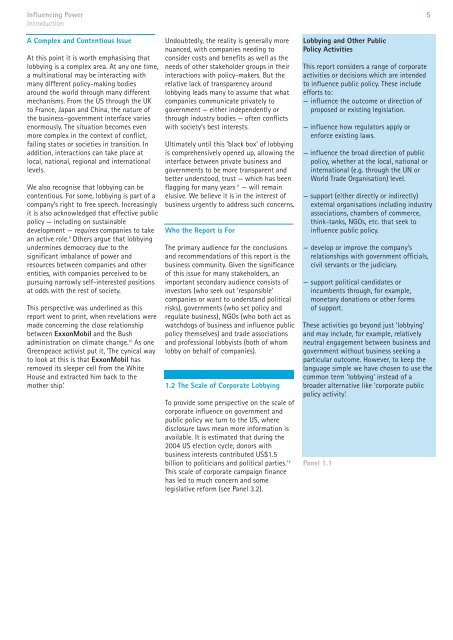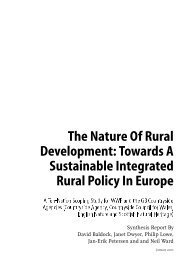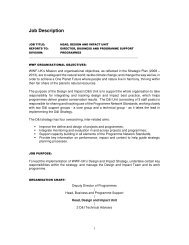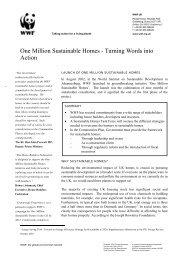Influencing Power - WWF UK
Influencing Power - WWF UK
Influencing Power - WWF UK
- No tags were found...
Create successful ePaper yourself
Turn your PDF publications into a flip-book with our unique Google optimized e-Paper software.
<strong>Influencing</strong> <strong>Power</strong>IntroductionA Complex and Contentious IssueAt this point it is worth emphasising thatlobbying is a complex area. At any one time,a multinational may be interacting withmany different policy-making bodiesaround the world through many differentmechanisms. From the US through the <strong>UK</strong>to France, Japan and China, the nature ofthe business–government interface variesenormously. The situation becomes evenmore complex in the context of conflict,failing states or societies in transition. Inaddition, interactions can take place atlocal, national, regional and internationallevels.We also recognise that lobbying can becontentious. For some, lobbying is part of acompany’s right to free speech. Increasinglyit is also acknowledged that effective publicpolicy — including on sustainabledevelopment — requires companies to takean active role. 9 Others argue that lobbyingundermines democracy due to thesignificant imbalance of power andresources between companies and otherentities, with companies perceived to bepursuing narrowly self-interested positionsat odds with the rest of society.This perspective was underlined as thisreport went to print, when revelations weremade concerning the close relationshipbetween ExxonMobil and the Bushadministration on climate change. 10 As oneGreenpeace activist put it, ‘The cynical wayto look at this is that ExxonMobil hasremoved its sleeper cell from the WhiteHouse and extracted him back to themother ship.’Undoubtedly, the reality is generally morenuanced, with companies needing toconsider costs and benefits as well as theneeds of other stakeholder groups in theirinteractions with policy-makers. But therelative lack of transparency aroundlobbying leads many to assume that whatcompanies communicate privately togovernment — either independently orthrough industry bodies — often conflictswith society’s best interests.Ultimately until this ‘black box’ of lobbyingis comprehensively opened up, allowing theinterface between private business andgovernments to be more transparent andbetter understood, trust — which has beenflagging for many years 11 — will remainelusive. We believe it is in the interest ofbusiness urgently to address such concerns.Who the Report is ForThe primary audience for the conclusionsand recommendations of this report is thebusiness community. Given the significanceof this issue for many stakeholders, animportant secondary audience consists ofinvestors (who seek out ‘responsible’companies or want to understand politicalrisks), governments (who set policy andregulate business), NGOs (who both act aswatchdogs of business and influence publicpolicy themselves) and trade associationsand professional lobbyists (both of whomlobby on behalf of companies).1.2 The Scale of Corporate LobbyingTo provide some perspective on the scale ofcorporate influence on government andpublic policy we turn to the US, wheredisclosure laws mean more information isavailable. It is estimated that during the2004 US election cycle, donors withbusiness interests contributed US$1.5billion to politicians and political parties. 12This scale of corporate campaign financehas led to much concern and somelegislative reform (see Panel 3.2).Lobbying and Other PublicPolicy ActivitiesThis report considers a range of corporateactivities or decisions which are intendedto influence public policy. These includeefforts to:— influence the outcome or direction ofproposed or existing legislation.— influence how regulators apply orenforce existing laws.— influence the broad direction of publicpolicy, whether at the local, national orinternational (e.g. through the UN orWorld Trade Organisation) level.5— support (either directly or indirectly)external organisations including industryassociations, chambers of commerce,think-tanks, NGOs, etc. that seek toinfluence public policy.— develop or improve the company’srelationships with government officials,civil servants or the judiciary.— support political candidates orincumbents through, for example,monetary donations or other formsof support.These activities go beyond just ‘lobbying’and may include, for example, relativelyneutral engagement between business andgovernment without business seeking aparticular outcome. However, to keep thelanguage simple we have chosen to use thecommon term ‘lobbying’ instead of abroader alternative like ‘corporate publicpolicy activity’.Panel 1.1














![[PDF] Causes for concern: chemicals and wildlife - WWF UK](https://img.yumpu.com/31929970/1/184x260/pdf-causes-for-concern-chemicals-and-wildlife-wwf-uk.jpg?quality=85)

